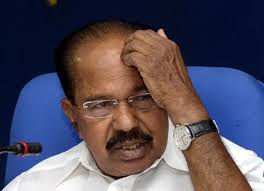New Delhi, Feb 11: Delhi government's decision to order filing of an FIR against Petroleum Minister M Veerappa Moily, former minister Murli Deora and RIL chief Mukesh Ambani for alleged collusion to hike the prices of natural gas has invited sharp criticism from Samajwadi Party even as CPI's Gurudas Dasgupta welcomed the move.
UB Group chairman Vijay Mallya, on the other hand, said that the Delhi Chief Minister was pursuing "unconventional methods" to attain his objectives while adding that there should be no "witch-hunt" against industrialists.
The case will be based on a "common complaint" filed by former Cabinet Secretary TSR Subramanian, former Navy Chief Admiral RH Tahiliani, eminent lawyer Kamini Jaiswal and former Union Secretary EAS Sarma.
Alleging that there was collusion between ministers, officials and Reliance Industries Ltd to hike the prices of natural gas from KG basin, Kejriwal said the details in the complaint were "shocking" and amounted to anti-national activity as it was an assault on the country's economic sovereignty.
Hitting back, Moily said that fixing of the prices of petroleum products was done as per expert advice. He also said that he took special interest in ensuring that CNG and PNG prices were reduced.
"I think I should sympathise with his ignorance. He should know how the government functions, how these things are done ... You should know that I took special interest to ensure that CNG and PNG prices were reduced," Moily said.
"It is not the question of Mukesh or Deora... There should be a certain system for fixing the prices. I think nothing is done without expert advice," Moily said.
"Kejriwal thinks that we can take out oil just like taking water from a well in a bucket, (but) we cannot take the oil like that," he added.
Samajwadi Party, which gives outside support to the UPA government, also attacked Kejriwal for registering FIRs against Union ministers and industrialists, saying it was all a "drama" to hide inefficiency and attain "political martyrdom".
"This is a drama staged by inexperienced people to hide their inefficiency... This is 100 per cent a political witch-hunt," SP leader Naresh Aggrawal told reporters.
He said it was a new trend in the political system that "whosoever comes to power, starts registering FIRs against political rivals and talks about arresting them. No one is talking about development."
If Kejriwal is serious about addressing inflation, "why does he not cut the prices of essential items in Delhi? The national capital is the most expensive place in the country," Aggrawal added.
But CPI leader Dasgupta welcomed the Delhi government move.
"I welcome Kejriwal's move to take up the case of KG Basin and the hike in gas prices allowed by the government. It is a total fraud committed by the government, particularly Moily, in allowing a steep hike in gas prices from four to eight dollars on the basis of an unsubstantiated survey," Dasgupta said here.
"It is once again a case of the government being hand-in- glove with the top corporate house to give it unfettered profits," said Dasgupta, who has been raising the issue for the past several months and even gone to Supreme Court over it.
"It is a loot of public money. (The government's decision to hike gas prices) will seriously affect the power and fertiliser sectors," he said.
UB Group chairman and Rajya Sabha MP Mallya said that in view of the forthcoming general elections, some political parties had stepped up the practice of trading accusations, which should be taken with a pinch of salt.
"I think Mr Kejriwal is pursuing unconventional methods to achieve his objectives. Industry must be respected as it contributes to economic growth... It should be treated with dignity and respect.
"If Reliance or any other company has done (something) that should not be done, there is due process of law. But I would not support any witch-hunt," he said.







Comments
Add new comment